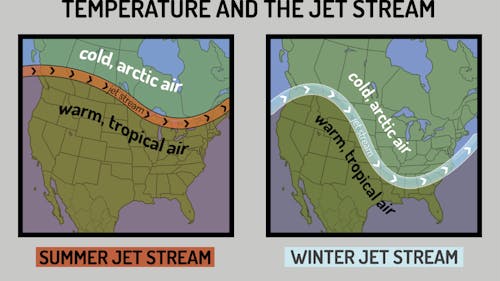Rutgers professor: "Temperatures are off the charts"

Despite freezing temperatures caused by the most recent polar vortex, the end of 2016 is expected to remain warmer than in previous years.
The warm weather is the result of a combination of environmental changes which all stem from an excess of greenhouse gases in the atmosphere, said Jennifer Francis, a research professor with Rutgers’ Institute of Marine and Coastal Sciences.
“The temperatures are off the charts right now," Francis said.
She said the high temperatures are part of a long-term trend over the past 30 years. Though the unusually high temperatures of 2016 should alarm the public, this year's spike in temperature was not a sudden phenomenon, Francis said.
While researchers have long been aware of this particular trend, the polar jet stream, a fast-moving river of air circling the Northern Hemisphere, is under close watch because it has had unusual activity over the past fall, Francis said.
“It has been taking very large northward and southward swings," she said. "You can just picture a jump rope going northward and southward."
These swings not only carry a significant amount of warm air from the tri-state area to the arctic, but also carry the colder arctic air back toward southern regions, such as New Jersey. This will result in a downwards spike in New Jersey's temperatures when the jet stream swings back later in the winter, Francis said.
“The difference in temperature between the arctic, which is typically very cold, and the areas farther south drive the winds of the jet stream,” she said.
A larger difference in temperatures this year may be the cause of these swings. Warm, southern air swinging northward contributed to the melting of a great portion of the arctic’s ice, Francis said.
“When we lose a lot of the sea ice, it allows a lot more of the sun’s energy to be absorbed by the ocean,” Francis said. “Then, when fall comes along and the ice is trying to freeze, the ocean is so warm that it takes a lot longer.”
Heat from the water then enters back into the atmosphere, further heating the air and reinforcing the process, she said.
Francis said this melting of sea ice will result in a rise in sea level in N.J., which will increase the severity of all future storms.
“We know the damage from Hurricane Sandy was much worse because the sea levels are now much higher than they were back in, say, the 1950s,” she said.
Francis said that this is all related to the fact that the general temperature of the planet has been increasing.
“We are doing our best to raise awareness and help people understand what is happening, why it is happening and what we expect to happen in the future,” she said.
As extreme weather can affect the economy, water resources, food security and other aspects of people’s everyday lives, less severe trends and changes in weather must be taken seriously, Francis said.
The most direct way Rutgers students can help the environment is to reduce their fossil fuel usage Francis said. In addition, raising awareness can help combat the rapid, significant climate changes, she said.
Rutgers students should especially care about trends in the weather because of their recent experience with Superstorm Sandy, said Marissa O’Connor, a School of Environmental and Biological Sciences sophomore.
“A lot of people tend to forget that the Earth is one big ecosystem in itself … it is not just focused in one area,” she said.
Climate change will impact everyone, she said. While landlocked places will never be hit by a tropical storm, they might still feel the overall impact from these weather-related events.
College students have the power and the numbers to fight together for climate change, O’Connor said.
“I really think we should all be environmental stewards and go out and create change because this is a present problem, and we can be the frontier,” she said.
O’Connor believes students should begin by convincing older populations, who are inclined to misunderstand or feel apathetic towards the impact of these changes, she said.
Tereza Marshyti, a School of Environmental and Biological Sciences junior, said she is concerned about the consequences of these overly high arctic temperatures, and attributes more underhanded causes to its seriousness.
Cutting down on the amount of meat one consumes can benefit the environment, she said.
“Animal agriculture is actually one of the leading causes of carbon dioxide emission and methane emission,” she said.
Awareness of this factor must be spread more thoroughly, Marshyti said.
Society uses energy excessively, Marshyti said. At Rutgers, she feels it is unnecessary to keep the lights at High Point Solutions Stadium on at all hours of the day, she said.
“Education is so important. Classes can inform students, organizations can inform students and a lot of reading the news,” Marshyti said.
She said that if the United States is not taking large enough steps to solve the environmental issues at hand, it cannot expect other countries to do so.
“It is our planet. It may not personally affect us in the next 50 years, but it will affect our kids … We are not just here to live, eat and die. We have a role,” Marshyti said.
Stephen Weiss is a School of Arts and Sciences sophomore majoring in philosophy. He is a correspondent with The Daily Targum.



